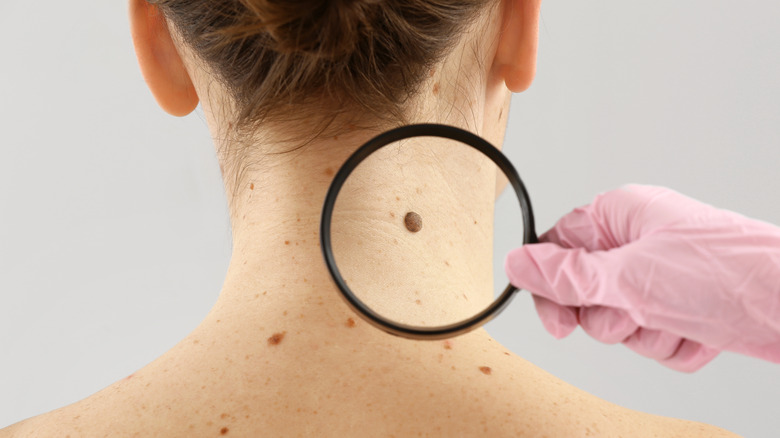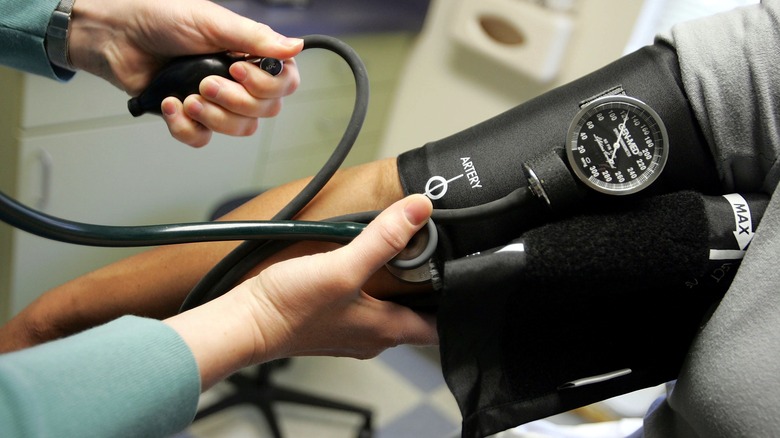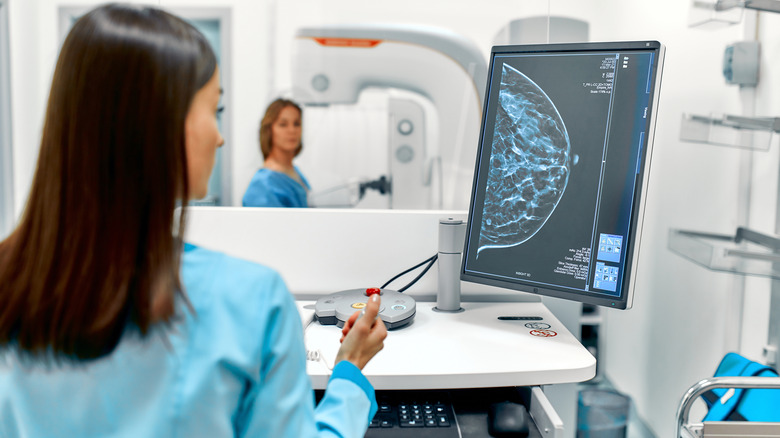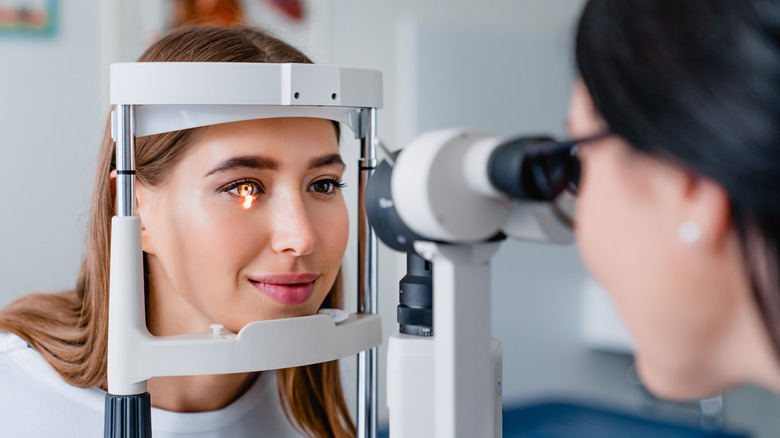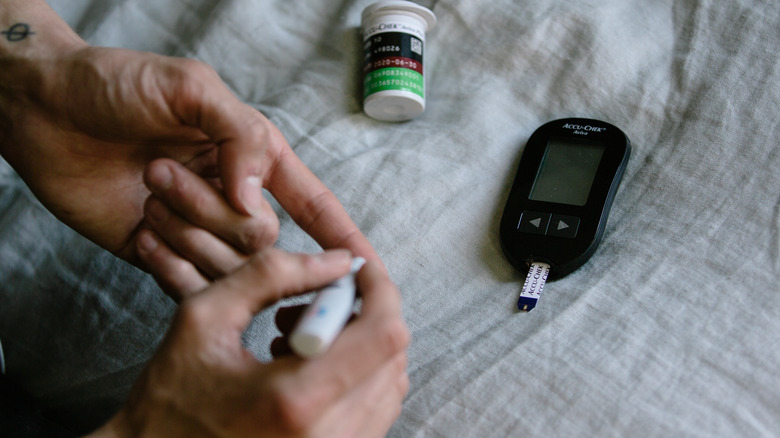Things About Your Mom's Health You Should Probably Know
Knowing who's who in your family tree is interesting and exciting, giving you a glimpse into your family's history and what's made you into the person you are today. But knowing your family's health history is a must, because the conditions that run in your family could affect you one day. Most importantly, you should know as much about your parents' health history as possible. According to the Centers for Disease Control and Prevention (CDC), chronic conditions can run in families, and your doctor will want to know if any of them are present in yours.
Because we're a mix of each of our parents, it's crucial to know both your mother's and father's health history. But as a woman, there are certain hormonal conditions and health problems that affect women exclusively or more frequently, and these topics are important to note with your mother. For instance, executive director of Duke Integrative Medicine Tracy Gaudet tells Health that "Knowing your mother's gynecological history can really arm you with what you need to know to take proactive steps in the future."
The American Medical Association suggests collecting a family health history that details chronic illnesses, deaths, and ethnicities of first, second, and third-degree relatives. Arming yourself with this information can help your doctor predict your risks and find possible early warning signs of disease. While collecting your family's health history, talk to your mom about the following points.
If she's had any skin conditions
Melanoma is the most severe type of skin cancer (via American Cancer Society). It develops in melanin-producing cells and is thought to be caused by ultraviolet radiation from the sun or tanning beds (via Skin Cancer Foundation). However, there can be a genetic component to melanoma, too, making a family's risk of developing it higher than usual. In families in which two or more first-degree relatives, like a parent and child, have melanoma, the phenomenon is known as familial melanoma (via Cancer.Net). There are currently two known genes that, if they have a mutation, can lead to an increased risk of developing melanoma.
While knowing your mom's history of melanoma is important, there are several other skin conditions she might have that you could be more prone to as well. Penn Medicine Dermatology notes that neurofibromatosis, which affects the skin and nervous system, has genetic foundations. Other skin-related conditions that could pass through your family include basal cell nevus syndrome, Cowden syndrome, and Gardner syndrome.
Her history of weight gain
Does mom seem to have a difficult time losing weight? Believe it or not, her weight struggles could have a genetic basis. According to Harvard Health Publishing, more than 400 genes could potentially play a role in obesity based on the bodily processes they control, like body-fat distribution and stress coping mechanisms. How much those genes predispose you to weight gain can be different in each family — but they could affect your family's genetics by as much as 80%.
Still, gastroenterologist Andres Acosta writes on the Mayo Clinic's website that, while genes can have some influence on your ability to lose weight, they're only part of the problem. Your environment and choices can also profoundly affect what your body does, which is why it's crucial to make healthy lifestyle changes, especially if your genes are working against you. Acosta suggests that those worried about their genetic makeup can use genetic testing to determine what healthy changes to make based on their energy expenditure, body composition, and other factors.
Her heart health history
For years, you've probably heard that if your family members have had heart disease, you're probably at a greater risk for developing it, too. There's some truth to that, says UCI Health cardiologist Shaista Malik. Knowing your mom and dad's heart health history is a good idea to understand where your risk lies. However, Malik says that it's not a final sentencing. "A family history of premature heart disease is a significant risk factor," says Malik. "But, just like other risk factors such as high blood pressure, high blood sugar or cholesterol, it can be controlled with lifestyle changes."
But there is scientific evidence that relates genetics with cardiovascular disease. An article published in a 2020 issue of Heart Views explains old and new genetic marker discoveries as they relate to cardiovascular disease risk. One study found that a family history of premature coronary artery disease increased cardiovascular disease mortality by 44%. Still, the article's authors stress that a family also shares a similar environment with one another, and environmental factors may also increase the family's risk.
How pregnancy affected her
Hearing about your mom's less-than-ideal pregnancy may not be what you were hoping for before you begin having children of your own. But there seems to be some connection between your mom's pregnancy conditions and how your future pregnancies may go, so it's a good idea to stay informed (per What To Expect). For example, morning sickness — especially severe morning sickness — has been found to have genetic foundations. And women whose moms had gestational diabetes have a higher risk for developing the condition with their own pregnancies.
Preeclampsia, a term meaning high blood pressure during pregnancy, can also run in families, so your risk may be higher if a close female relative, like your mom, also had it (via Health). Associate professor of obstetrics and gynecology Laura Riley tells Health that women experiencing preeclampsia should expect to have more frequent doctor visits to monitor the condition throughout their pregnancies. This is to prevent health problems with mom and baby and the potential of preterm birth, which also has underlying genetic influences. According to a 2020 article in the Annals of Human Genetics, studies have shown as much as a 40% heritability risk of preterm births in families.
Her struggles with getting pregnant
Fertility issues may also run in families, and your mother might be the window into your fertility future. Infertility is defined as the inability to get pregnant after 12 months of actively trying, but it can be caused by various factors, including physical conditions and environmental stressors. A 2014 article in The Application of Clinical Genetics analyzed research exploring genetic influences of fertility. Findings showed that several reproductive conditions leading to infertility, like premature ovarian failure (POF) and Perrault syndrome, have genetic foundations.
Endometriosis, a condition in which uterine tissue grows outside of the uterus, can also cause infertility and has "familial clustering," according to an author manuscript in Clinical Obstetrics and Gynecology. Reviewed studies show that women with first-degree relatives with the condition are as much as seven times likelier to have it themselves. Polycystic ovarian syndrome (PCOS) may also have a genetic component, according to a 2019 article in The Application of Clinical Genetics. The condition may be responsible for as much as 40% of female infertility, and there are currently several known genes associated with PCOS.
Her history with breast lumps
One of the most common questions you'll hear from your doctor about your family's health is whether there's any history of breast cancer. That's because as many as 10% of breast cancers may be hereditary, so your mother's breast cancer could very well mean that you're more at risk for developing the condition. The genetic implications mostly have to do with two genes, BRCA1 and BRCA2. When these genes mutate, they can in turn cause abnormalities in breast and ovarian cells, which can lead to cancer (via BreastCancer.org).
If your mother, sister, or even an aunt has or has had breast cancer, your doctor may suggest that you start getting mammograms early. According to Johns Hopkins Medicine, that may mean getting screened as early as five years before the age at which your relative was diagnosed. However, all women should also screen with self-breast exams at least once a month, leading to the early detection of abnormal lumps in the breasts (per the National Breast Cancer Foundation, Inc.).
If migraines affect her
Those pesky, often debilitating headaches you get could be more than just headaches. They might be migraines, a severe type of headache that can cause significant pain and other symptoms, like sensitivity to light and sound, nausea, and fatigue (via MedlinePlus). If your mom experiences migraines, you might have a higher chance of experiencing them, too. Though according to MedlinePlus there's no clear hereditary pattern with migraines, more than half of people who get migraines have at least one family member who also gets them.
Recent research has also backed this up. A 2019 scientific review in The Journal of Headache and Pain discovered several links between genes and migraines. For instance, migraines lead to altered brain structure and function in imaging, and these alterations are thought to be influenced by genes. Other studies conducted on families and twins suggest that the heritability of migraines could be as much as 30-60%. And researchers have found three genes — CACNA1A, ATP1A2 and SCN1A — whose mutations are present in families with the presence of familial hemiplegic migraine (FHM).
Does she have any eye problems?
According to Cleveland Clinic, hereditary connections may contribute to several problems with eyesight and eye function. In addition to several eye disorders that get passed onto infants at birth, like congenital glaucoma and retinal degeneration, other conditions like strabismus, retinitis pigmentosa, and macular degeneration seem to have a genetic component. As many as one-third of other inherited conditions can also cause eye problems.
There are currently more than 350 eye conditions that can be passed through generations, says Research to Prevent Blindness. Genetic testing for eye conditions exists, and it might not be a bad idea to take advantage of it if your eye doctor suggests it (per Harvard Medical School). The Genetic Eye Disease (GEDi) test scans 226 genes known to cause eye problems and is about 98% accurate in detecting potential issues. Whole exome sequencing can also shed light on familial eye conditions, with promising accuracy of up to 88%.
Her mental health
About one in five adults experienced mental illness in 2019, making it much more common than many realize (via the National Alliance on Mental Illness). Still, with the stigmas that surround mental illness, it may not yet be something that your mom has openly talked about with you. But more and more research shows that genetics can influence your mental health, making it a discussion you should prioritize. Research funded by the National Institutes of Health found common genetic factors in five well-known mental conditions, including depression and bipolar disorder. And a 2019 article published in Brain: A Journal of Neurology says that multiple studies have found that schizophrenia heritability ranges from 60-80%.
Even more worrisome is the potential link between genetics and suicide. A 2020 study in Molecular Psychiatry estimates that 4% of genes in the human genome may contribute to heritable suicide risk. Psychiatrist Douglas Gray also explains the results of another suicide study to Cronkite News: "[The researchers] looked at a group of children who were adopted at birth and then grew up and completed suicide," Gray said. "It turned out that almost all of the risk of suicide was from the biological relatives and not the relatives that raised the child. So your suicide risk doesn't come from the parents that adopt you. It comes from the parents you never met."
If Alzheimer's runs in the family
Alzheimer's disease is a condition of the brain that gets worse over time, causing symptoms like poor judgment, difficulty speaking, and problems remembering things and people (per the Alzheimer's Association). The condition runs along a continuum of severity, from exhibiting no symptoms to having symptoms that interfere with everyday life. By 2050, it's estimated that 12.7 million people and 65 and older will be living with Alzheimer's disease.
Although Alzheimer's can happen to people without a family history of the condition, research does show some hereditary links to it. The Alzheimer's Association explains that two types of genes — risk genes and deterministic genes — may influence Alzheimer's disease in families. While risk genes can increase the chances of a family member developing Alzheimer's, deterministic genes have a direct contribution to the condition. Only about 1% of Alzheimer's patients are thought to have deterministic gene influences, but in these cases, the condition can begin developing in a person's 40s. The National Institute on Aging notes that early-onset symptoms to look for include having trouble managing bills and daily tasks, getting lost easily, and mood or personality changes. There's currently no cure for Alzheimer's disease, but some recent treatment options have proven to be promising for its future (per the FDA).
Her history of diabetes
Both type 1 and type 2 diabetes can be affected by genetics (per the American Diabetes Association). If your mom has diabetes, there's a chance that you're more genetically predisposed to the condition as well. Women who were younger than 25 when their child was born and who have type 1 diabetes have a 1 in 25 chance of passing it onto their child. If the woman was over 25 at the time of birth, the chances lower to 1 in 100. However, type 2 diabetes has a greater chance of moving around in the gene pool than type 1 diabetes.
Still, lifestyle can significantly impact someone's ability to develop type 2 diabetes. The CDC states that prediabetes acts as a warning signal that it's time to make lifestyle changes, particularly losing weight and participating in regular exercise. People with parents who have type 2 diabetes are more likely to have prediabetes, especially if they're overweight, 45 or older, and don't exercise three or more times a week. Eating healthy, getting into an exercise routine, and lowering stress and anxiety could prevent diabetes, regardless of your family history with the condition.
If she's ever been affected by addiction
If your mom has ever lived with a substance addiction, it's something you should know about because it has the potential to affect you. A 2014 study published in Translational Psychiatry examined the genetic basis of addiction. Researchers noted that several genes linked with alcoholism are involved in other bodily processes, like cognition and anxiety — and this overlap could help psychiatric professionals diagnose and treat alcoholism within the context of overall mental health. One gene in particular, SNCA, could contribute to neurodegenerative diseases and make people more vulnerable to alcohol cravings.
But like other conditions with a genetic basis, addiction is also influenced by the environment. While some people may be more susceptible to addiction because of their genetic makeup, there still need to be environmental triggers that pull it out of a person. According to Harvard Health Publishing, stress is one of the most common triggers. Stress can release glucocorticoids, which can wreak havoc on other bodily systems, including the brain.
When she started menopause
Did you know that the age your mother started menopause could predict the age you'll be when you start the process, too? Although lifestyle habits and environmental influences can affect when you hit menopause, the majority of the process remains in your genes (via Science Daily). The average age to begin menopause is 52, but if you're in a family of women who start menopause earlier or later, there's a good chance you will follow in their footsteps. According to Health, there are even blood tests women can take that could help them predict when menopause may start. Although the tests are not yet perfect, researchers continue to use genetics to refine the tests for more accuracy.
Fortunately, you don't need to worry much about mirroring your mom's menopause symptoms, as experts don't see as much of a genetic connection there. Women's health expert Christiane Northrup tells Health that lifestyle factors can affect menopause more than genes. Northup names exercise, a healthy diet, and stress reduction as ways to for women to limit the undesirable symptoms of menopause.
What to do if you don't know your mom's medical history
Many women may not be able to learn more about their mother's medical history. If that's the case for you, don't worry. There are other ways that you could gather your family history to help your doctor take care of you. The Mayo Clinic suggests speaking with other family members, including your grandparents, aunts, uncles, and cousins, to fill out your health history, if possible. Public records, such as birth certificates and death certificates, could also help you fill out the missing pieces. The National Human Genome Research Institute provides a free family health portrait for families to fill out online to assist their doctors.
You might also consider genetic testing if you have concerns about a particular condition. Modern at-home genetic testing kits could be a good start, but you should also discuss genetic testing with your doctor first. WebMD says that some of these tests require a doctor's prescription anyway, and they have some limitations that might not make them right for your particular situation. Depending on your health history and what you know about your family's health, you and your doctor can make an informed decision on whether genetic testing makes sense for you.


